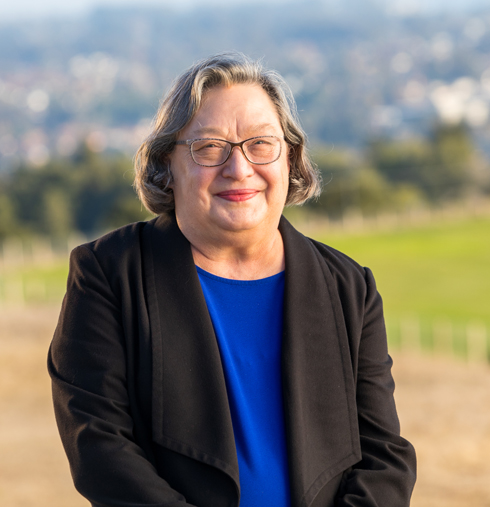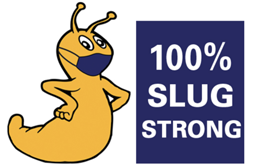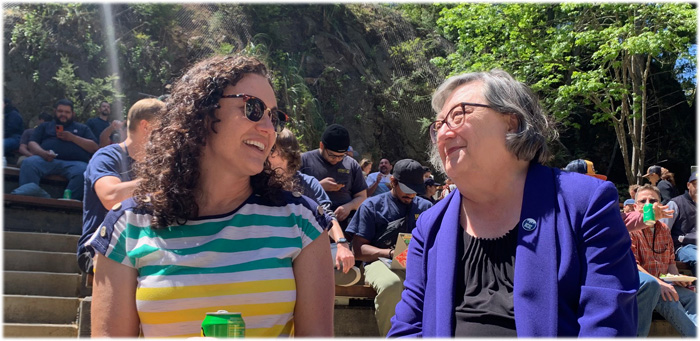Tell us a bit about yourself, your background, and how your path led to where you are today.
I am from South Dakota, grew up in the Black Hills, and moved to the country when I was about 7. My father worked for the Homestake Gold Mine as a laborer. We had a 30-acre subsistence farm, where we raised a big garden, and had some animals. One of my jobs was to milk the cows. I had a lot of wonderful experiences. I was in a 4-H where I got involved in projects related to range management, grass identification, and caring for pasture lands. During a forestry project, I collected specimens from the trees, learned about them and about forestry. Those were interesting developmental experiences for me.
I got involved in projects related to range management, grass identification, and caring for pasture lands. During a forestry project, I collected specimens from the trees, learned about them and about forestry. Those were interesting developmental experiences for me.
So from an early age, I was interested in the environment. When you grow up in an area with lots of natural beauty, the closeness to nature builds in you both an appreciation of the natural world and our responsibilities to care for it. Santa Cruz and the Black Hills are very similar in that way. We didn’t have the redwood trees or an ocean, but we were in the pine trees, among turkeys and deer, and things all around you are beautiful. So it has been something I have cared about throughout my life. I grew up during the environmental movement and was informed by it. I remember reading Rachel Carson's book, Silent Spring, when I was young. When my husband Jim and I moved to Santa Cruz in 2019 for me to take on the chancellor’s role, I looked through my things and found a letter that I received from someone at Ford Motor Co. back in the early 1970, in response to a letter I had written to the Ford president, saying that we “had to do things to reduce the car pollution caused by automobiles.”
My parents didn’t go to college, but wanted a better life for me, and they saw that path through education. My mother would have liked to have gone to college but there wasn’t the resources or the support.
Jim and I lived for many years in Lawrence, Kansas, where we moved after I finished my PhD at UC Riverside in 1992. My degrees are in chemistry, and my research and practice in the field of analytical chemistry, which have given me a practical solutions-oriented approach to address problems and challenges.
After a few years in Lawrence, we moved onto a farm where our girls — we have two daughters — could grow up. We had a big garden, an orchard, we raised horses, and had a great life there. Being close to the land is something that I’ve carried through my life. We were excited about the opportunity to come to Santa Cruz because we feel very much at home here. We like being in the woods and love the values of UC Santa Cruz. They really resonate with me. Having as our founding values sustainability and social justice is very important, and we have to live those values as best we can everyday. As a first-generation college student from a low-income family, I am so proud to be chancellor at UC Santa Cruz because of our commitment to broad access to the opportunities that higher education offers.
What are some of the accomplishments you are most proud of and/or feel very grateful for through your past few years at UCSC?
I think I am most proud that we survived! That CZU fire was a real stress for all of us. At that time I was writing email messages to the campus every day, and I remember that I wrote two messages before I went to bed one night, and the one I thought I would have to send was labeled “worst case scenario.” Luckily I was able to send the ”best case scenario” message, saying that “the wind had shifted overnight, we are so grateful to CalFire, and that we will keep the campus updated.”
That fire was a very scary moment. It really reminded me that the university is not just a place, it is the people, the values, and the work we do. The way that our campus pulled together through COVID, through fire, through labor strikes, and all of the other challenges that we faced, I am extremely proud.
I think in terms of accomplishments, having campus goals is crucial. We established goals when I came, and one goal has changed over time: I arrived believing we should be more efficient and effective because we are a public institution and we are underfunded and have to stretch every dollar. But after the fire and COVID, we realized we had to also be more sustainable and resilient. So this year, when we launched Leading the Change: The UC Santa Cruz Strategic Plan effort, we mapped our committees and our charges to our goals, and really doubled down on climate-change sustainability and resilience. We are now finalizing the strategic plan and adding recommendations, with goals that we can work toward to help us achieve our big goals, with metrics to follow our progress along the way.
Climate change is here! We see it now very profoundly. I think it’s smart to have it be part of our students’ education, dealing with it in such a way that it doesn’t depress everybody. We humans brought about climate change, but we  can bend the curve. It is not too late to act! How do we work to mitigate climate change? We are so proud that the state invested $20 million to help start our Center for Coastal Climate Resilience, which is focused on nature-based solutions to climate change. I think that solutions are important, the idea of working with nature is important, but it is equally important to engage with communities, and that’s something unique that the center does. Like we saw with COVID, which was a magnifier for inequity, climate change is as well. Those impacts will be magnifiers for inequity and the greatest harm will be on the communities that are least able to address the impacts. So we have to think together, with communities, about how we can help address climate change impacts and mitigate them. Who better to do this work than UC Santa Cruz?
can bend the curve. It is not too late to act! How do we work to mitigate climate change? We are so proud that the state invested $20 million to help start our Center for Coastal Climate Resilience, which is focused on nature-based solutions to climate change. I think that solutions are important, the idea of working with nature is important, but it is equally important to engage with communities, and that’s something unique that the center does. Like we saw with COVID, which was a magnifier for inequity, climate change is as well. Those impacts will be magnifiers for inequity and the greatest harm will be on the communities that are least able to address the impacts. So we have to think together, with communities, about how we can help address climate change impacts and mitigate them. Who better to do this work than UC Santa Cruz?
An important part of sustainability is to think about the impact of our daily actions. Trying to be sustainable as a university is a lot harder because it is this big matrix of an organization. One of the things that was hard during COVID, for the few students who were living on campus, is that we had to switch to take-out packaging for dining. That was a choice we had to do to be able to continue our work. We also all got so used to ordering things online. We now need to think about other ways to do things. We have the opportunity to think about how we could become a zero-waste campus and what would that mean. Composting has now come to the city of Santa Cruz, but doing that at the scale of the university is hard. We are a small city of 25,000 people on campus nearly every day. What would composting look like for us?
It is also important for us to find ways to actually reduce the amount of waste in the first place.
How about transportation and how we think about our own vehicles? Is it better to get an electric car, or to keep your current car? There is the whole issue of the carbon footprint just to build a new car. I see a lot of people getting electric bikes and I thought about getting one, but I am also 65, so I thought, “What if I crash on my bike?” I am not as young as I used to be. I was just walking with my daughter recently and I tripped and fell, walking. I hurt my knee so bad that I thought, “What if I crash on a bike going 30 miles an hour?” There are so many factors to think about when making these kinds of sustainability decisions.
Last year the campus launched a Decarbonization and Electrification Task Force, and shortly after we received financial support from the state to support that work. That is helping to give us a roadmap for what we can do to electrify the campus. We have to build up our infrastructure to be able to do that. Then next year, the Sustainability Office is going to launch a new five-year sustainability plan, and that will be very powerful for our campus, too. So when I think about sustainability, I think we can make lots of small decisions that integrate to have a larger impact.
At the start of this academic year, campus launched Leading the Change: The UC Santa Cruz Strategic Plan, which covers the next 10 years. Could you share your vision for how this could help advance sustainability at UCSC?
I am really excited about the work that was done here. The Climate Change, Sustainability and Resilience Committee was led by Elida Erickson, who directs our Sustainability Office, a real long-time leader and supporter of sustainable practices, and Sikina Jinnah, a faculty member in Environmental Studies. They did an incredible job of engaging the greater campus community and providing feedback around the issues relating to their charge. That is important because it is each of us on campus who is going to have to effect change, the change that we need to be, right?
Within the committee’s report, members detailed a lot of opportunities, including education in climate change, and how each of our students might have some training in it. They included other things that we can do as a campus to

help with climate change, sustainability, and resiliency because those three things really go together very nicely. We also have a challenge with campus power, so we want to make sure we keep the lights on and build resilient infrastructure as we decarbonize and electrify the campus to become fossil free in the long-term.
The resiliency part is what we need both to get through climate change and for when we encounter unknown things that seem to come upon us on a daily basis. So far, the Santa Cruz climate has been mild enough that the campus has not had to cool buildings for comfort. But in 10 or 20 years, that might not be the case, so we need to think ahead about how we can be sustainable as we respond to a warming climate .I am hoping that the strategic planning exercise will be a kind of GPS for the campus as we try to navigate through the next decade. We encourage all campus community members to submit public comments on the draft plan anytime through June 30 to help us craft a more comprehensive strategic plan.
Lastly, what do you do for fun outside of work?
My grandchildren bring me great joy. Mira, 5, and Oliver, 7, live in Los Angeles so we are able to see them pretty frequently. They are a lot of fun and bring me a lot of happiness. My daughters and my husband are also a great source of comfort and joy to me. Jim and I have been married for 44 years this June.
I like to walk and be outdoors — that is something that renews me. During the pandemic I took on jigsaw puzzles. I can sit with those puzzle pieces, and they occupy my mind in a way that helps me relax. It is a calm and quiet activity. I also like to cook. I used to garden, though I am not gardening these days, but it will always be a passion, so I like to visit gardens. I love our Arboretum. It is a great place to walk.
Anything else you like to add?
I want to give a shout-out to the Sustainability Office, which really helps the campus to live our values and engage students. We have to remember that at universities, while faculty and staff are here year after year, our students come and go. Every year is a new set of students, a new opportunity to help people think differently about the environment, about themselves, and how they connect. I think the office does a great job doing that.
